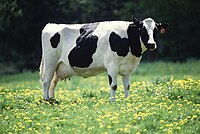
Photo from wikipedia
BACKGROUND Pork is an important food for humans and improving the quality of pork is closely related to human health. This study was designed to investigate the effects of balanced… Click to show full abstract
BACKGROUND Pork is an important food for humans and improving the quality of pork is closely related to human health. This study was designed to investigate the effects of balanced branched-chain amino acids (BCAAs)-supplemented protein-restricted diets on meat quality, muscle fiber types, and intramuscular fat (IMF) in finishing pigs. RESULTS The results showed that compared to the normal protein diet (160 g kg-1 crude protein), the reduced-protein diet (120 g kg-1 crude protein) supplemented with BCAAs to the ratio of 2:1:2 not only had higher average daily gain (P < 0.05) and carcass weight (P < 0.05), but also improved meat tenderness and juiciness by decreasing shear force (P < 0.05) and increasing water holding capacity (P < 0.05). Particularly, this treatment showed higher (P < 0.05) levels of phospho-acetyl-CoA carboxylase (P-ACC) and peroxisome proliferation-activated receptor-γ (PPARγ), and lower (P < 0.05) level of P-AMP-activated protein kinase (P-AMPK), increasing composition of IMF and MyHC I (P < 0.05) in longissimus dorsi muscle (LDM). In terms of health, this group increased eicosapentaenoic acid (EPA) (P < 0.01) and desirable hypocholesterolemic fatty acids (DHFA) (P < 0.05), and decreased atherogenicity (AI) (P < 0.01) and hypercholesterolemic saturated fatty acids (HSFA) (P < 0.05). CONCLUSION Our findings suggest a novel role of balanced BCAAs-supplemented RP diet in the epigenetic regulation of more tender and healthier pork by increasing IMF deposition and fiber type conversion, providing a cross-regulatory molecular basis for revealing the nutritional regulation network of meat quality. This article is protected by copyright. All rights reserved.
Journal Title: Journal of the science of food and agriculture
Year Published: 2021
Link to full text (if available)
Share on Social Media: Sign Up to like & get
recommendations!